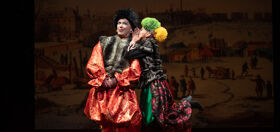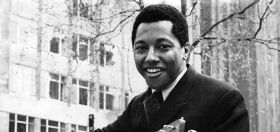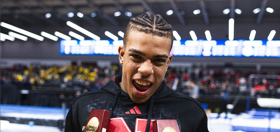
Eliot Schrefer may be one of America’s next great writers. Only 28-year old, the Harvard graduate just released his second novel, The New Kid.
An exploration of estrangement, elation, sex and sin, The New Kid offers the reader two half-siblings: Humphrey and Gretchen. The bulk of the novel revolves around their respective struggles – Humphrey’s attempts to adapt in his new Floridian town and the last gasps of Gretchen’s relationship. The final third brings them together in a surprisingly suspenseful climax. As a whole, Schrefer’s stark prose delves into the perils of universal alienation.
Our editor recent caught up with Schrefer for a chat. See what the boys had to say about teenage objectification, S&M and why Schrefer thinks it’s alright to be bored.
After the jump, of course…
Andrew Belonsky: We were just chatting and you said you enjoyed writing The New Kid more than your first, Glamorous Desires. You said The New Kid was a much more “honest experience”.
Eliot Schrefer: There are so many other young authors out there – I knew I had to make strategic choices to make the book, get an agent, getting a publisher. I ended up creating a book that wasn’t necessarily the most intimate story that I knew, but one that I thought would break me out and get me a publisher. The second book, I had a lot more liberty to write what I liked. That’s what came out.
AB: What was your intention?
ES: I don’t know if I had an intention. When you read books and you realize the author’s intention – that tends to be not the most satisfying experience. I had written two short stories that I wanted to marry and make one book.
AB: And that’s Humphrey and Gretchen?
ES: Actually, one was from [divorced] Brandy’s point of view, in the first section – the scene when she’s at the gym class watching her son that she’s barred from seeing. I thought the first part would be largely about her and then it became a totally different story. It became Humphrey’s story, so I had to go back and reedit it. Then there was a short story about a young woman flying to Tokyo to visit a boyfriend she was about to breakup with – that was the voice of Gretchen. That story didn’t make it into the book, but she became Gretchen.

AB: The concept of “newness” comes up in a lot of different ways, but I’d specifically like to discuss one part where Gretchen’s talking about her relationship with Rajan. She wonders, “How does anyone remain the person who was fallen in love with…” Did you draw that from your own experience?
ES: There’s a time in every long-term relationship when you realize that you will eventually know everything about the other person. Or know enough that you can predict. You won’t have a sense of excitement. You have to learn to love boredom and the day-to-day pleasantness instead of those first ten dates of excitement. I think Gretchen was feeling that she always had to provide that first energy of discovery. She always had to allow herself to be discovered.
AB: But maybe she was right. Maybe it does have to be new and exciting.
ES: Well, for her it certainly did. The relationship wasn’t working once it wasn’t.
AB: There’s also a dread to newness.
ES: How so?
AB: For example, Humphrey is the new kid at school. He’s excited about it, but he’s dreading the experience of being new, of having to make friends, etcetera.
ES: The reason why I wanted to focus on newness in the book is that we’re at a moment in time when we can easily move and pick up. In the past, you were stuck in your town, stuck with your family and you had to accept what was there because there wasn’t always the option to move on. Now, we definitely have the option to move on… start a new job, a new relationship. And I think that comes with a lot of risks: the idea that there’s always something better stops a lot of people from attaching to their life right then. If you wanted to talk about intention of the book, that’s the closest you would come: I wanted to explore the risks of always thinking there is something better out there.
AB: Gretchen and Humphrey are both looking for families and they have these familial fantasies that end up getting shattered in terrible ways…they don’t go back to their mother, because she’s a bad parent, so they form this new family.
ES: Family is the one thing that is, for most people, inescapable – until you reach a certain age. Gretchen manages to by getting a scholarship to a boarding school. Humphrey can’t escape his parents and all the energy that should be going toward a parent attachment can’t, so he’s looking for other places to send it. My parents are divorced and I’m not so close with my dad, so I definitely know about estrangement with a parent, but I also know about that feeling of complete support from one parent. I find the estrangement much more interesting in a literary sense.
ES: Humphrey especially, he’s pretty insecure. He’s got a really backward sense of his own self worth. I think he really thinks the only thing he has to offer – and it’s really a recent gain – is the physical side of things, especially with Mr. Lansing. He wants to stay in this new family and be of use to someone, and I think he falls back on his own body, which has been a fairly common theme attached to young female protagonists in books. In culture right now you have increasing objectification of young males, especially over the last ten years: the idea that he can be an object to be looked at and admired for its beauty. I think young men are facing it more and more, gay or straight. I wanted to approach that. For Humphrey and Gretchen, the most passionate interactions they have are uneven ones and I think that’s true for most people.
AB: That’s what passion is – there has to be that imbalance.
ES: Yes, but it just depends where you look for the imbalance. You can go for extremes, like with S&M or you can go for the more moderate sense in “I’m talking more tonight, someone else is talking more tonight”. But, yeah, there’s definitely uneven dynamics for Humphrey and Gretchen and they happen to be on the weaker side of the dynamic in most of their relationships.
AB: Have you thought about what happens to Gretchen and Humphrey?
ES: I did an interview last week and the guy asked, “Is Humphrey gay?” In ten years, I’m almost certain he would be. Right now, he’s gone through such a gothic upbringing that he can’t – he can identify acts, but I don’t think he would self-identify. He’s not ready.
AB: How old were you when you came out?
ES: It sort of goes in stages, doesn’t it? The first person I told, I was seventeen.
AB: Who was that first person?
ES: My best friend who ended up being my boyfriend the last year of high school. I had a party at my place and people were drunk. As the party was dying out at 3 in the morning, I was playing a video game and I felt somebody playing with my hair and I looked around and it was him. He had a girlfriend at the time and she sort of brokered it. She was so beyond either of us. She knew what was going on. It was one of those Southern love stories where someone has to figure it out for you.
AB: You’re from Florida.
ES: Yeah, I spent middle school and high school there.
AB: Does your mom still live there?
ES: Yeah.
AB: Do you like it?
ES: I like visiting because, living in New York, it’s nice to go to a Wal-Mart once in a while – not that I buy anything! But, yeah, I do like visiting, but only for three or four days.
AB: Poor Humphrey gets beat up a lot.
ES: Every time you have a teenage protagonist, the question is, “Is it a young adult novel?” and I wanted to write about being a teenager without the safety you get in novels about teenagers. There are always boundaries that aren’t crossed, but in real life they often are. Violence, sexual violence, non-traditional sexualities are often overlooked in young adult books – I think that’s a huge part of the teenage experience.
AB: Would you recommend this book to a teenager?
ES: It’s hard – I work with a lot of teenagers. I wouldn’t go right out there and say it, in case I offended some of their families. I think this is a book – I partially wrote it because I would have loved to read it as a teenager. I think it would be hard to officially give it to young adults, because it’s not what young adults are supposed to read.
[The New Kid‘s out now from Simon & Schuster. For his next novel, Schrefer’s tackling the ever-daunting historical novel.]

















